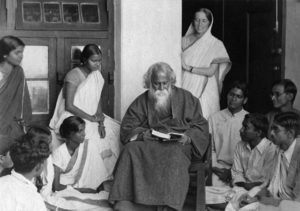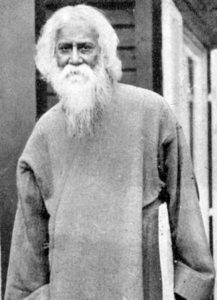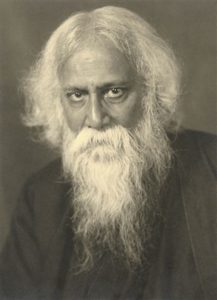By Uma Purkayastha
 Rabindranath Tagore, the great poet philosopher, a versatile genius, though outwardly sombre in appearance and posture, but was jovial by nature. According to Tagore, life would be dry like a desert if there is no humour. In his personal and domestic aspects, there are innumerable instances of his great wit and amusing sensibilities.
Rabindranath Tagore, the great poet philosopher, a versatile genius, though outwardly sombre in appearance and posture, but was jovial by nature. According to Tagore, life would be dry like a desert if there is no humour. In his personal and domestic aspects, there are innumerable instances of his great wit and amusing sensibilities.
Maitreyi Devi, who had been closely associated with him and served him till his last days, described many interesting stories of Tagore’s humorous instances, in her book ‘Swarger Kachakachi’ which are evocative.
Rabindranath would sneeze with an exceptionally vociferous sound which he himself termed it as ‘Earth Terrorising Sneezing’ (Biswakampayani Hachi). He would compose rhymes and songs on his sneezing, tuning them in his own way which were amusing!
With an entourage of staff holdings, including officials and non–officials, his attendants, and chefs, Tagore had assigned many of them names in hilarity but in a dignified way which would not hurt but rather glorified them. One such example was one of his personal assistants, Sushakanta Babu who had a big bald patch on his head, and Tagore named him ‘Mr. Baldwin’.
Tagore’s inspiration of the name was from Stanley Baldwin a famous statesman who served the Prime Minister on three occasions.
In another such anecdote, Rabindranath would consume a glass of Neem Sarbat, a beverage made from boiling neem leaves till the water turned green, and which imparted an obvious bitter taste but was of great medicinal value. The great laureate was known to drink this every morning on an empty stomach, braving its bitterness.
One fine morning he was drinking that Neem Sarbat in a transparent tumbler, when a stranger came to visit him. The visitor glanced at the green beverage greedily, drawn to its alluring colour. Rabindranath on observing his gluttonous expression, took a sip making a delicious sound! He asked the stranger, ‘Would you like one too?’ The stranger nodded in affirmation.
 Rabindranath called his attendant pronto and ordered for another glass of that sarbat. Accordingly it was offered to the stranger who took it eagerly; but after the very first sip, made a very distasteful, peculiar face! It was oh-so bitter!
Rabindranath called his attendant pronto and ordered for another glass of that sarbat. Accordingly it was offered to the stranger who took it eagerly; but after the very first sip, made a very distasteful, peculiar face! It was oh-so bitter!
Rabindranath derived great pleasure from his reaction and burst into laughter. Such was his humour!
Once there was a meeting of the intelligentsia in Calcutta (now Kolkata); where Rabindranath was one of the participants. The subject of discussion were social problems plaguing Bengal. One such issue was the deepened plight of the widows. The question arose, as to how the Hindu widows of Bengal who were under strict dietary restrictions, could survive in comparison to other women. The answers from the participants were not satisfactory or acceptable. Rabindranath remained silent. Everybody was looking at him expectantly. He stood gravely and said, ‘I think the widows live longer because they are rid of the oppression of their demi-gods, i.e their husbands!’
The whole audience burst into a big laughter! His point could not be ignored.
Rabindranath is known to have a trail of many such instances depicting his jovial side. Once he called a meeting of the University Professors in Santiniketan regarding some reformation of administrative rules. A good number of professors from different universities joined the meeting. Rabindranath discussed the administration of ‘Viswabharati’ Institution and asked for suggestions, if any. A young professor stood and pointed out some faults of Tagore’s administration in Viswabharati. Rabindranath observed minutely, and defended his views, but the professor insisted on his stand.
After the meeting, everybody criticised the young professor for his audacity to argue with such a big personality which was considered indecent and ungentle. The young professor himself realised his fault and was repentant. After the meeting, they spent the night in a hostel at Santiniketan. The next morning a messenger came to call the young professor to meet Tagore. The professor was nervous and everybody was sure, it was a reaction to the previous day’s incident. Anyway, he went to meet Tagore.
When he went to meet Tagore, in a very grave voice Tagore asked him to come inside and be seated. The professor took his seat gently and was preparing himself mentally for any adverse situation!
Tagore in a hoarse voice said, – You committed a blunder yesterday!
The professor admitted to it very humbly.
Tagore reacted dramatically, “You will have to accept a ‘Danda’ (punishment) for that.”
The professor more humbly said, ‘Yes Gurudev, I am ready to get a ‘Danda’ from you’!
Tagore in a very grave voice said, ‘Then get ready, I am coming!’
 He left his seat, entered the adjacent room, and came back with a ‘stick’ in his hand, and said in a loud dramatic voice “Take your ‘Danda’, you left yesterday in the meeting.”
He left his seat, entered the adjacent room, and came back with a ‘stick’ in his hand, and said in a loud dramatic voice “Take your ‘Danda’, you left yesterday in the meeting.”
Both of them burst into laughter.
The Bengali word ‘Danda’ has two meanings; one is ‘punishment’ and the other is ‘stick ‘which was a style/fashion statement for the ‘middle class’ to carry one. The young professor followed that and in this case, both are implied suitably. Rabindranath intentionally used the word ‘Danda’ to keep the suspense of his delivery intact.
As a teenager, Maitreyi Devi, once drew a nice picture of a beautiful girl, and showed it to Tagore. Tagore in a very disappointing voice said, ‘You girls are very selfish. Men who are painters always draw pictures of girls sincerely; but you never draw pictures of the menfolk!’
Maitreyi Devi admitted to that, and attentively drew up a picture of a young handsome prince on horseback, which Rabindranath highly appreciated and humorously asked Maitreyi whispering, ‘Is he your person of choice?’
Such was his innocent humour!
It is worth mentioning that the age difference between Tagore and Maitreyi was 53 years, and yet they shared a relationship one like that of grandfather-granddaughter.
It was also found through different literary works that Rabindranath himself believed in ghosts. Though he did not admit that openly, in many of his short stories, there are indications of the existence of the supernatural or the unearthly. He would also frighten others with ghost stories, and revel in it.
Once Maitreyi Devi came to Santiniketan as a guest in his house. Rabindranath welcomed her warmly with all arrangements for her stay. In the evening Rabindranath visited Maitreyi’s chamber and told her that the room had a picturesque view by the adjacent window; but the only problem was that, at the dead of night a ‘headless man’ would sing loudly while others were asleep.
Maitreyi trembled, ‘Headless man?!’
Rabindranath then assured her not to be worried, as the headless man was harmless! He told her that during the ‘Nilkar oppression’ the headless man was victimised and his head was chopped off by the oppressors. He was a very good singer, so his sad, aggrieved soul with a headless body would wander and sing through the night, but he did no harm!
Maitreyi Devi admitted that she had heard the song in the wee hours of the night, but it was later found that it was only the nightguard.
Such was the humour of Tagore.
Once in Santiniketan, when classes were about to commence in the morning, there arose some chaos in the classrooms. On the notice board, it was declared a holiday. Everybody rushed to the board, and Rabindranath too reached the spot. Yes, it was clearly written and duly signed by Tagore himself that it was declared a holiday! Rabindranath was stunned to see his own handwriting. Syed Mujtaba Ali, then a teenager, and a student at Santiniketan, appeared before Tagore and bowed his head, ‘Please forgive me Gurudev! It is me, who copied your handwriting and signature. It is ‘April Fool’s Day’ today!
Being fooled, Rabindranath burst into laughter and embraced the boy Mujtaba! Such was his magnanimity!
[This story was collected by the author herself from Syed Mustafa Ali, elder brother of Syed Mujtaba Ali, once her neighbour]
Another enjoyable incident from Tagore’s early years was when Atul Prasad Sen and Sarat Chandra, three rising poets and writers were invited by a Zamindar (Landlord) of ancient Calcutta, to grace a function in his village. They started their journey by a local train. They were greeted by a group of young girls with flowers and garlands to receive them at the Railway station. Rabindranath, a young poet of Bengal was welcomed by a young girl with a garland. Rabindranath asked her name, and she smartly replied with a smile – ‘I am Godhuli’ to which Tagore appreciated the meaning of her name Godhuli which means evening.
Sarat Chandra and Atul Prasad were also duly greeted, but Sarat Chandra minutely remarked that ‘Godhuli’ welcomed Rabindranath with special attention.
The meeting started and the Zamindar himself, proudly introduced the personalities to the audience and welcomed them with immense respect.
During recess, they were taken for sightseeing to a beautiful place nearby. It was named ‘Bakultala’ as the garden was surrounded by ‘Bakul trees’, a very sweet scented flower.
Upon their return, the afternoon was filled with songs and recitations. Atul Prasad was singing. A boy approached Rabindranath and handed him a small folded piece of paper. Rabindranath accepted the paper eagerly, glimpsed upon that, which read, ‘Dear poet, please come to Bakultala in Godhuli’. Rabindranath swiftly kept it in his pocket. Sarat Chandra asked what that was, Rabindranath replied vaguely.
In the evening, when the function was over, they began their retreat towards the railway station. After crossing a few steps, Rabindra



